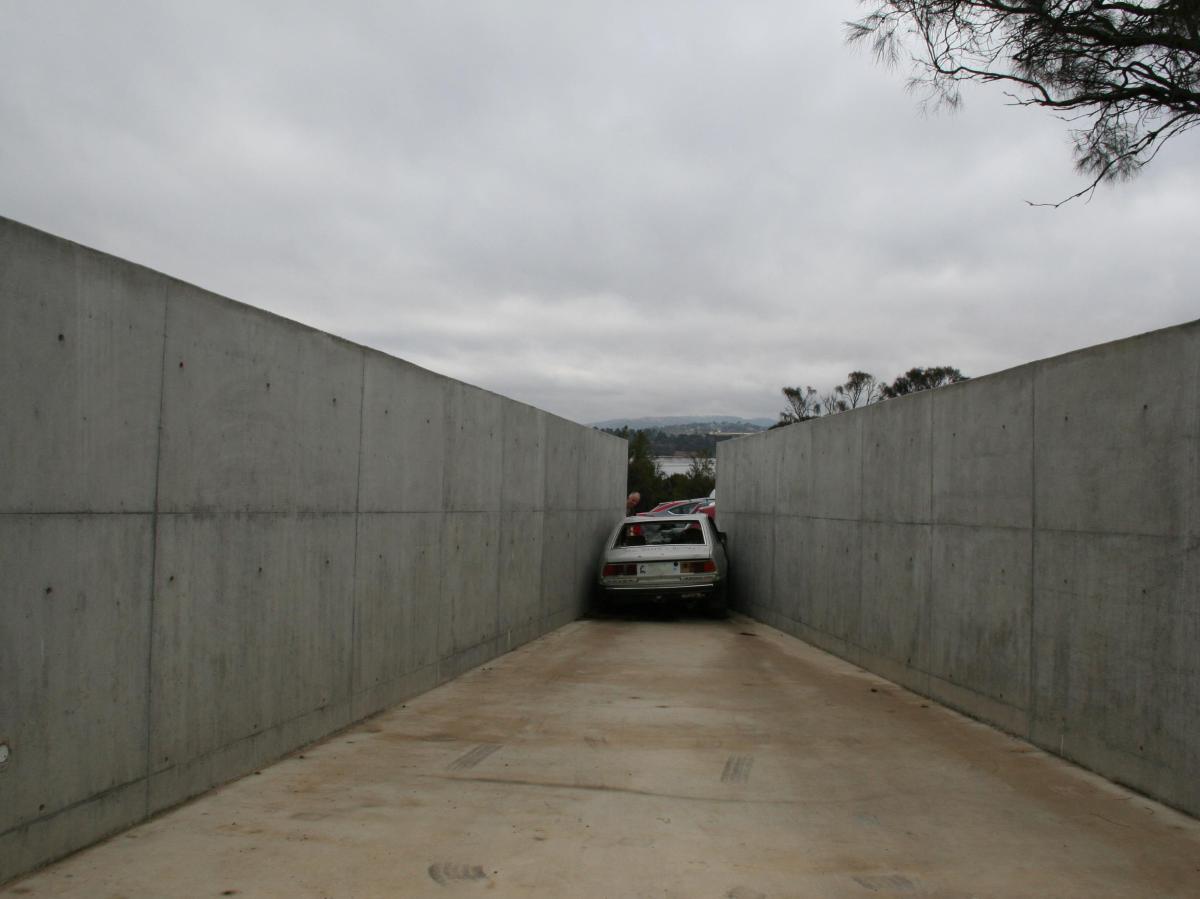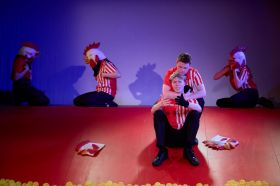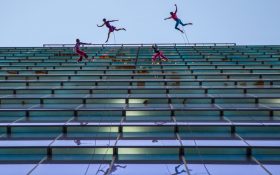Engpass, MONA, 2011 by Roman Signer. Photo: Deborah Stone
I am sitting in the train station in Canberra at the moment, waiting for the 5.25 to Sydney. I do love a travel terminal – airports, trains stations, bus depots…. they herald the beginnings and the ends of stories! Places where we transition from one place to the next, physically and mentally – sometimes lamenting the end of a holiday, sometimes celebrating the return home to the familiar and comfortable, sometimes excited for the new and unknown.
Its good people watching too, and no, not everyone in Canberra looks the same!
The idea of transition came up during my meetings in Adelaide last week. I was meeting with Zoe Bettison, Minister for Communities and Social Inclusion in South Australia. She mentioned opportunities for community arts and cultural development (CACD) to play a role in the changes happening in the north suburbs of Adelaide around Elizabeth and Salisbury.
What she was referring to, of course, is the closure of the Elizabeth Holden manufacturing plant in just three years’ time. No longer will Holden, a widely accepted Australian icon, be manufactured on our shores, which is a huge blow not only to the cultural psyche of the nation but for the many hundreds that rely on jobs at the plant. The economic impact is significant for South Australia residents who have relied on the industry for decades and cherished their connection to the Holden brand.
Big change is coming and it is, for many people, the end of an era.
I was wrapt to hear a Minister in the South Australian government acknowledging that the CACD could contribute to the transition in the Elizabeth region as both past and present employees grieve for the loss of an organisation that has played a huge role in their lives. They grieve not only for the job losses but also for what it has represented – it has helped them build homes, raise families and enjoy life. It was a place where they felt useful, and a place where they made friends. A place that represented the heart of Australia’s motoring history and they felt like they were a part of that – a part of something bigger.
And yes, let’s hope the government boffins who are charged with the ‘transition’ in the north of Adelaide think outside the square. Let’s hope that alongside only the re-skilling, education and job placement programs there are also projects where residents and employees can acknowledge the Holden story from their perspective – a collective celebration of the community centred around the enormous manufacturing icon.
Loss certainly brings sadness and anger but the types of things that often make the grief bearable is celebration of the past and acknowledgement of why it was so meaningful, the telling of the stories in a way that makes sure things are not forgotten – the development of legacy. That is what real transition is about!
Fingers crossed, the story of Holden as told by the community will be coming our way very soon – the ‘transition’ is ripe for community theatre, digital storytelling, documentary photography, projection art and all sorts of other creative things that will keep the Holden community legacy alive.
Whilst in Adelaide I also caught up with Helen Bock who is the Creative Director of the Community Arts Network SA (CANSA). They too are enjoying a transitional time in what has been a long and productive history. Dealing with a significant funding reduction in recent times, the organisation has been forced to re-think its position in South Australia and take stock of the ‘who’ and the ‘what’ of CANSA. It’s an interesting process for any organisation and something that we should all possibly do every few years – hopefully without the loss of funding to prompt the discussion.
It was great to see Helen and enjoy her enthusiasm despite the challenges and I am pleased to say their new office at the Lion Arts Centre, right in the middle of Adelaide definitely has a good vibe. CANSA has offered so much to the community arts and cultural development sector over the years and it was beneficial for me to hear about all the resources they have and the broad network that they service in SA. It is very clear, that as Creating Australia begins to develop its own position in the sector, establishing its role as a driver of sustainability and growth for CACD, that we are really just building on the work already done by organisations like CANSA. I look forward to collaborating with them and supporting Helen and CANSA in the future.
Fantastic to have over thirty faces at our “Conversations with Creating Australia” also – thankfully supported by the Creative Communities Network and the City of West Torrens. The conversation was enthusiastic with lots of ideas and a general sense of positivity around what Creating Australia is trying to do! A diverse group with community theatre, local and state government, art galleries, artists, regional development and community arts all represented.
Great also to meet up with Alex Reid, CEO of Arts SA, John Baxter from Co-Create Adelaide and Carl and Jen from Change Media, who are seriously chomping at the bit to get community arts and cultural development people engaging in a dialogue about the activism and advocacy needed in the sector.
And last, but not least, possibly my favourite meeting whilst I was in Adelaide was with Trish Hansen, from Arts SA. Not only did we have delicious Italian food, there is truly no end to the enthusiasm this woman has. I have worked with Trish on the Cultural Indicators Project in SA for some time and she is a great connector of people and ideas – lots of opportunities talked about – all to be progressed in the weeks to come.
For more from Maz McGann visit his blog http://placestories.com/folks/McGann#!v=blog





